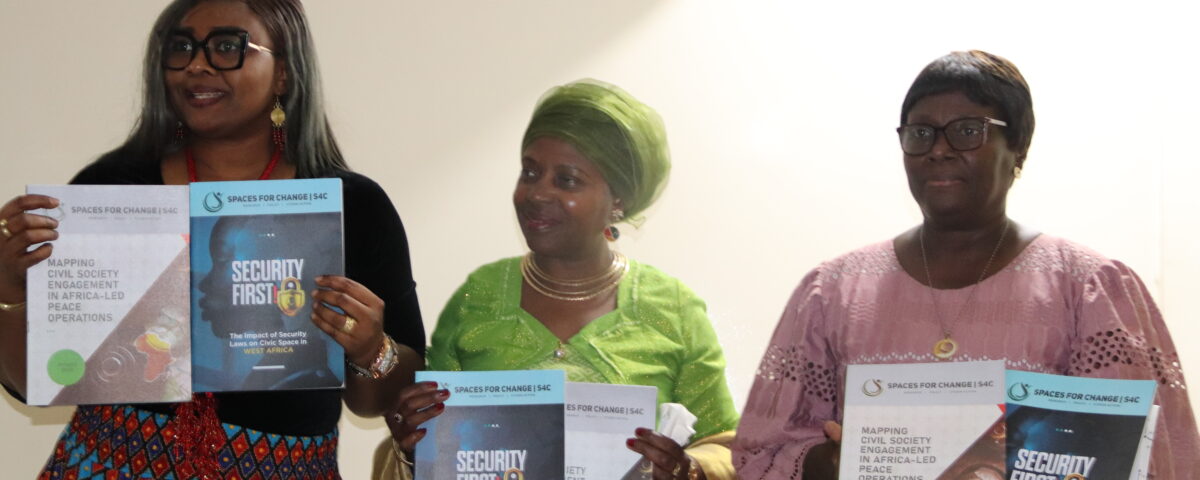Banjul, 29th January 2025 – The two-day West Africa Regulatory Compliance Clinic (RCC) officially opened today, bringing together Civil Society Organizations (CSOs), regulators, and compliance experts across The Gambia and Sierre Leone. Organized by Spaces for Change in collaboration with the African Centre for Democracy and Human Rights Studies, the event aims to enhance the capacity of Non-Profit Organisations (NPOs) to navigate complex regulatory frameworks while safeguarding their operational independence.
In her opening remarks, Mrs Victoria Ibezim-Ohaeri, Executive Director of Spaces for Change discusses the evolving landscape of non-governmental organizations (NGOs) in West Africa, emphasizing the complexities of compliance with a multitude of legal frameworks that have made it increasingly difficult to establish and operate NGOs compared to the past, where passion could drive their formation. She stresses that adherence to these regulations is essential not only for organizational credibility but also for protecting against liability arising from the actions of representatives, while also highlighting the importance of understanding how regulations can be misused to target human rights defenders and restrict civic space, ultimately fostering a collaborative environment for NGOs through shared experiences and support.
Mrs. Hannah Forster, Executive Director of the African Centre for Democracy and Human Rights Studies (ACDHRS) emphasized the significance of CSOs in promoting democracy and human rights in West Africa. She highlighted the challenges faced by smaller organizations, particularly regarding compliance with regulatory standards amidst limited resources. She stresses the importance of understanding the legal landscape governing NGOs, especially in light of funding complexities and risks related to money laundering and terrorism financing.
She encourages active participation in the training, which aims to equip attendees with essential knowledge and tools to navigate these challenges effectively. Forster also underscores the value of collaboration among organizations, advocating for mutual support and sharing of knowledge to strengthen civil society across the region. She reaffirms the African Center’s commitment to fostering a safe and enabling environment for CSOs to thrive in their mission of advancing democracy and human rights.
Commissioner Litha Musyimi-Ogana of the African Commission on Human and Peoples’ Rights expressed her honour and gratitude for being present at the training, emphasizing the importance of civil society engagement in governance and policy implementation. She highlighted her dual role as a country rapporteur for The Gambia and Sierra Leone, stressing the challenges of engaging civil society in Sierra Leone.
Reflecting on her career, she acknowledged that her early years in advocacy involved direct criticism of governments. However, her experience in government roles provided her with insight into the complexities of compliance and policy implementation. She emphasized that while governments may not always act effectively, they have strengths that civil society should complement rather than solely criticize.
She underscored the crucial role of civil society in advocacy, policy implementation, and urgent interventions, particularly where bureaucratic constraints hinder government action. Drawing from her two decades of experience with the African Union, she affirmed her commitment to fostering collaboration between civil society and government.
Commissioner Litha also took the opportunity to acknowledge key stakeholders, including the Executive Director of Spaces for Change, the Executive Director of the African Centre for Democracy and Human Rights, and other distinguished guests and experts. She conveyed greetings from the African Commission on Human and People’s Rights and noted that Professor Remy Ngoi Lumbu, Chairperson of the Commission, could not attend due to commitments with the African Union Permanent Representative Committee.
The RCC is designed as a pushback mechanism against excessive regulation and state-imposed restrictions that have, in some cases, led to the shutdown of legitimate CSO activities. Participants will engage in expert-led sessions on financial compliance, anti-money laundering (AML), and counter-terrorism financing (CFT) measures. The initiative also aligns with global best practices, having been recognized in the revised Financial Action Task Force (FATF) Recommendation 8 Best Practice Paper.
This year’s RCC focuses on CSOs from eight West African countries namely; Nigeria, Ghana, The Gambia, Sierra Leone, Niger, Togo, Senegal, and Burkina Faso. Through a combination of workshops and collaborative discussions, the clinic seeks to build institutional strength and mitigate risks associated with regulatory non-compliance.
The event will continue tomorrow, featuring interactive sessions with experts and regional stakeholders.


